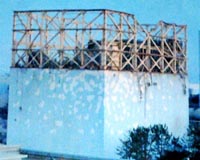 |
Tokyo (AFP) March 16, 2011 Foreign governments Wednesday urged their citizens to steer clear of quake-stricken northeast Japan and the capital Tokyo amid fears of further aftershocks and a widening nuclear disaster. US officials warned citizens living within 80 kilometres (50 miles) of the crippled Fukushima nuclear plant to evacuate or seek shelter amid mounting concern of a catastrophic meltdown. Britain advised its citizens to consider leaving Tokyo and northeastern Japan though British officials said there is still "no real human health issue that people should be concerned about". France's authorities said they were assigning two government planes to assist French citizens who wanted to leave Japan. "Given the possible evolution of the situation, French citizens in Tokyo are recommended to leave the region for the south of the country or for France," the foreign ministry said in a statement on its website. On Wednesday more than 180 people arrived in France after being evacuated by a plane that had brought French rescuers to Japan on Sunday. Germany, Italy and The Netherlands also advised their nationals to leave or refrain from travelling to the northeastern region. The quake and the tsunami it unleashed left more than 12,000 people dead or missing and knocked out the systems which cool the nuclear reactors at the Fukushima plant 250 kilometres (155 miles) northeast of Tokyo. Radiation levels have risen sharply at the plant, making it the world's worst nuclear incident since the 1986 Chernobyl disaster. Swiss authorities also called on citizens to leave the region, and the foreign ministry said it would put on charter flights if commercial airlines are unable to cope with demand from Swiss evacuees. Russia will begin evacuating dependents of its diplomatic and commercial personnel in Tokyo on Friday, the foreign ministry said. The Algerian and Colombian governments said they would send planes to Japan to repatriate their nationals. Colombia might transfer its embassy to Seoul, while Croatia is temporarily moving its mission to Osaka, the foreign ministry said. The ministry has already recommended to the estimated 40 Croatian nationals in Japan to leave the country. Serbia issued a similar call to some 100 Serbs on Tuesday. Serbian Foreign Minister Vuk Jeremic said that Belgrade's embassy would not move out of Tokyo, despite being damaged in the earthquake. Also Wednesday, several large Nordic companies, including IKEA and H&M, offered to help their Japanese employees leave Tokyo and surrounding areas and relocate further south. Swedish fashion giant H&M, which employs around 900 people in Japan, said it had offered its Tokyo and Yokohama-based employees help to relocate to a safer area, after having decided to shutter nine stores in the two cities. The US evacuation order came as the chair of the US Nuclear Regulatory Commission warned there was no water left in the spent fuel pool of reactor 4 at the Fukushima nuclear plant, resulting in "extremely high" radiation levels. The United States set up a much wider no-go zone than the 20-kilometre radius perimeter set up by the Japanese, after US authorities reviewed scientific and technical data about the nuclear emergency. US troops and pilots are also barred from venturing into the potentially radioactive area around the stricken Fukushima nuclear plant without specific orders, Pentagon spokesman Colonel Dave Lapan told reporters. burs/gd/mm
Share This Article With Planet Earth
Related Links Space Technology News - Applications and Research
 US warns citizens near Japan nuclear plant to leave
US warns citizens near Japan nuclear plant to leaveWashington (AFP) March 16, 2011 US officials Wednesday warned citizens living within 50 miles (80 kilometers) of a crippled Japanese nuclear plant to evacuate or seek shelter, amid mounting concern of a catastrophic meltdown. The evacuation order came as the chair of the US Nuclear Regulatory Commission (NRC) warned there was no water left in the spent fuel pool of reactor 4 at the Fukushima nuclear plant, resulting in "ex ... read more |
|
| The content herein, unless otherwise known to be public domain, are Copyright 1995-2010 - SpaceDaily. AFP and UPI Wire Stories are copyright Agence France-Presse and United Press International. ESA Portal Reports are copyright European Space Agency. All NASA sourced material is public domain. Additional copyrights may apply in whole or part to other bona fide parties. Advertising does not imply endorsement,agreement or approval of any opinions, statements or information provided by SpaceDaily on any Web page published or hosted by SpaceDaily. Privacy Statement |